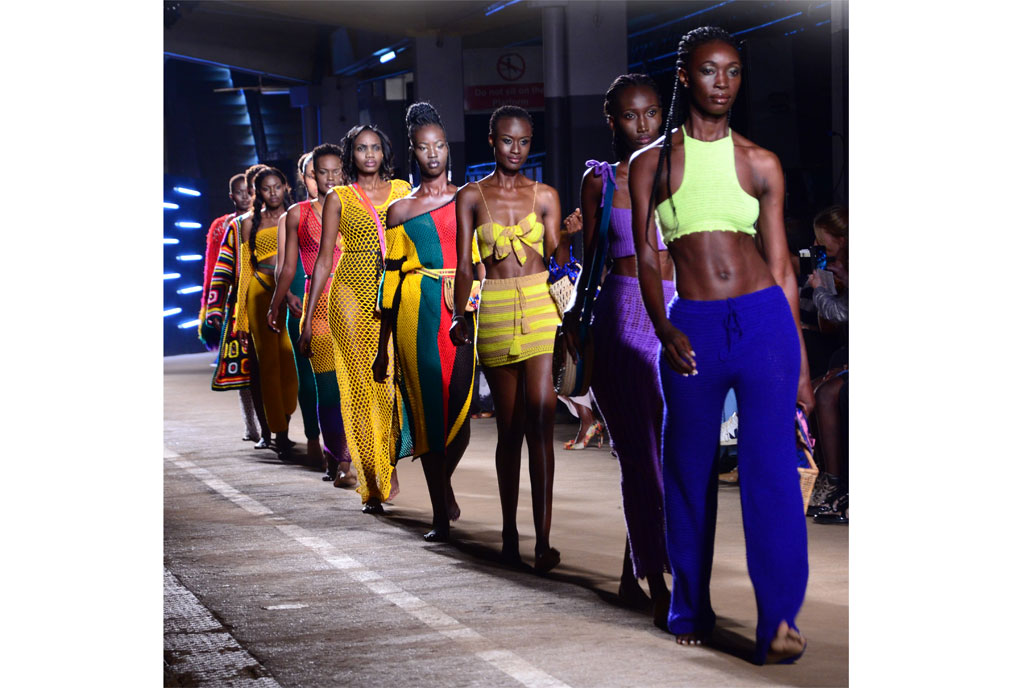FIVE YEARS AND COUNTING: Kampala Fashion Week (KFW) returned this year with a bang for its 5th edition. The three-day event which took place from September 27 to 29 saw a number of local and international designers showcasing their latest collections. Esther Oluka attended and took notes.
It is five years now since Kampala Fashion Week graced our social calendar. The event has since stamped its place as one of the anticipated fashion events in the country. The professionalism and production injected into the show is akin to that of many renown international fashion shows.
For instance, LDJ Productions, an event agency based in New York, was in charged of managing KFW. And this year, the event was organised at Kampala Railway Grounds.
Train stations often have that platform area (with benches) reserved as a waiting area for passengers. This is where the showcase took place, and, the advantage was that it provided a long runway. Gloria Wavamunno, the founder of KFW, said the reason she opted for the venue is because the train station is a beautiful representation of movement.
Highlight of the event
The first day of KFW was entirely dedicated to the Skilled Expressive Entrepreneurial Designers (SEED) show finale. Started in 2014, the project aims at promoting fashion entrepreneurship among youth in the country. The project involves selecting aspiring designers who are given the opportunity to make their own outfits and thereafter, their work is critiqued by judges. The designer whose work impresses the judges most, is declared winner.
This year, Brian Ssonko, 20, emerged winner from the 12 aspiring designers. The outfit he created (which had a mixture of black, brown and white colours) was inspired by a cow. Ssonko received a one-year full mentorship programme from the KFW team.
The designs
There were more than 10 designers, including Gloria Wavamunno, Edward Sempa, Olivia Nanfuka of NFKA clothing fashion brand, Emmanuel Bagwana of Egwana Kampala, Guy Maza, Nina Mirembe, among others.
Most of the designs that were showcased were functional and had clothes that could actually be bought off the runway.
For instance Bagwana’s afro-centric wear for both women and men. Part of his collection included traditional and evening wear. Guy Maza’s collection, ‘Sahel’ was also very impressive; it was colourful and made of interesting patterns.
“My collection was inspired by women from West Africa who are very beautiful and elegant. I used a fabric known as Faso Dan Fani, made by women from this region,” Maza told Sqoop magazine after his showcase on September 29. And for those who love going to the beach, Mirembe’s vibrant knitwear collection which focused on swimwear and lingerie was something to pay keen attention to.
Catwalk queens and kings
A fashion show is never complete without the models. Like the previous years, it was a mixture of both female and male models. There were some familiar faces, those who have walked for past editions of KFW such as Ronald Waiswa, Immaculate Aliba and Vanquisha Eyapu. Then, there were new faces such as former Miss Uganda Leah Kagasa, who looked confident and poised on her runway debut.
“I should probably do this more often. It is fun,” Kagasa said.
Some of these models say they were personally called by the team to walk for the show.
In 2014 and 2016, renowned supermodel, Aamito Stacie Lagum, the winner of the first season of Africa’s Next Top Model was flown in by the KFW team to be face of the event. She was not at the event this year.
Unusual runway music
The runway music that played as designers showcased was a little odd and strange. The kind that you hardly find playing in any bar or discotheque. These included the Field (minimal electronic), Skepta (grime), Devo (rock), Henry Purcell (classical baroque), Suicide (electro punk), among others.
At one point, models were walking to the soundtrack of cats repeatedly meowing, to the amusement of the audience.
Edward Sempa, a designer who also doubled as creative director of KFW, said it takes him months to look for music that rhymes with a particular designer’s collection.
“I sit with designers and ask them what message they want to portray as they are showcasing. If it is sadness or happiness, I find music that reflects that mood,” Sempa says. Overall, Sempa says the music blends with the designer’s visions and thoughts.
The dress code
Despite being a night fashion event, most of the guests and organisers dressed casually; jeans, shorts, t-shirts, jumpsuits, open shoes, sneakers and in other simple outfits. There was a female guest who came wearing a black nightgown. The event was a remarkable simple affair attracting fashion lovers from all walks of life.
Waiting for late comers?
If you have attended the past four editions of KFW, you may have noticed that the organisers always kept time. The case was different this year. For example, on day three, the event was supposed to start at 7.30pm, as indicated on the invitation cards, but it started at 9.50pm.
Wavamunno said the reason the shows delayed a bit this year was because most guests hardly keep time.
“We noticed that in the previous years, the show would begin when a number of guests had not yet arrived. So when they arrived the show was disrupted as some [guests] kept passing across the runway to locate their seats,” Wavamunno said

























































